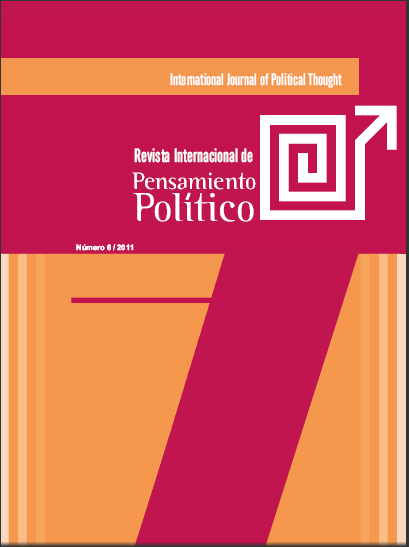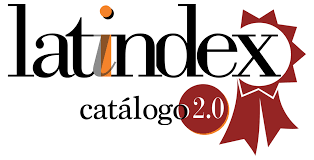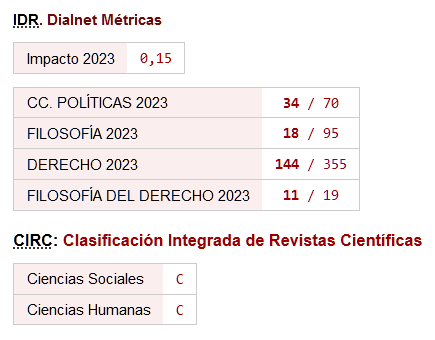Tres problemas para la concepción habermasiana de la democracia
DOI:
https://doi.org/10.46661/revintpensampolit.1882Palabras clave:
Habermas, discurso, ética , democracia deliberativa, comunicaciónResumen
La teoría discursiva de Habermas basada en el consenso de los participantes, siendo este consenso el fundamento de la corrección ética, ha sido objeto de crítica por sus limitaciones tanto en el terreno de la práctica como la teoría. El artículo pretende comentar y superar esas limitaciones. Es una tarea que deben realizar los partidarios de la democracia deliberativa, pues siempre la democracia deliberativa, en la que se concreta el discurso habermasiano, es más legítima que la democracia liberal. Las limitaciones aludidas en este artículo -la inconmensurabilidad discursiva, el dilema discursivo y la falla discursiva- podrían ser superadas y, aún si estos problemas no fueran totalmente superables, la democracia deliberativa es el mejor sistema político disponible.Descargas
Citas
BRENNAN, Geoffrey (2001), «Collective Coherence?», 21(2) International Review of Law and Economics.
CAMERER, Colin et al. (2003), «Regulation for Conservatives: Behavioral Economics and The Case for ‘Asymmetric Paternalism’», University of Pennsylvania Law Review.
CAPLAN, Bryan (2007), The Myth of the Rational Voter, Princeton, Princeton University Press.
CAPLAN, Bryan (2009), «Majorities Against Utility: Implications of the Failure of the Miracle of Aggregation», Social Philosophy and Policy, Vol. 26, No. 1.
COSSIO, Carlos (1945), El Derecho en el Derecho Judicial, Buenos Aires, Guillermo Kraft.
CROWDER, George (2002), Liberalism & Value Pluralism, London and New York, Continuum.
CHAPMAN, Bruce (1998), «More Easily Done than Said: Rules, Reason and Rational Social Choice», 18(2) Oxford Journal of Legal Studies.
DOWNS, Anthony (1957), An Economic Theory of Democracy, New York, Harper.
ELSTER, Jon (1986), «The Market and the Forum: Three Varieties of Political Theory», en Jon Elster and Aanund Hylland (comps.), Foundations of Social Choice Theory, New York: Cambridge University Press; Paris: Editions de la Maison des Sciences de l’Homme.
FARRELL, Martín (2003), «La argumentación de las decisiones en los tribunales colectivos», La Ley, F, 1161.
FEYERABEND, Paul K. (1962), «Explanation, Reduction and Empiricism», en H. Feigl y G. Maxwell (comps.), Minnesota Studies in the Philosophy of Science, Vol. III, Minneapolis, University of Minnesota Press.
HABERMAS, Jürgen (1973), Problemas de legitimación en el capitalismo tardío, trad. José Luis Etcheverry, Buenos Aires, Amorrortu.
HABERMAS, Jürgen (1991), Conciencia moral y acción comunicativa, trad. Ramón García Cotarelo, Barcelona, Península.
HABERMAS, Jürgen (1998), Facticidad y validez, trad. Manuel Jiménez Redondo, Madrid, Trotta.
HABERMAS, Jürgen (1996), «Paradigms of Law», 17 Cardozo Law Review.
HABERMAS, Jürgen (2002), Verdad y justificación, trad. Pere Fabra y Luis Díez, Madrid, Trotta.
HARDIN, Russell (1999), «Constitutionalism: Contract or Coordination?», in Liberalism, Constitutionalism and Democracy, Oxford, Oxford University Press.
IHERING, Rudolf von (1865), Geist des Römischen Rechts auf den Verschiedenen Stufen seiner Entwicklung, Leipzig, Breitkopf & Härtel.
JACKSON, Franck y PETTIT, Philip (1995), «Moral Functionalism and Moral Motivation», The Philosophical Quarterly 45.
JOLLS, Christine et al (1998)., «A Behavioral Approach to Law and Economics», 50 Stanford Law Review 1471.
KOROBKIN, Russell B. y ULEN, Thomas S. (2000), «Law and Behavioral Science: Removing the Rationality Assumption from Law and Economics», 88 California Law Review 1951.
KUHN, Thomas (2000), The Road since Structure: Philosophical Essays 19701993, Chicago, University of Chicago Press.
KORNHAUSER, Lewis A. y SAGER, Lawrence G. (1986), «Unpacking the Court», 96 Yale Law Journal.
Lawrence G. (1993), «The One and the Many: Adjudication in Collegial Courts», 81 California Law Review.
LAFONT, Cristina (1993), La razón como lenguaje, Una revisión del ‘giro lingüístico’ en la filosofía del lenguaje alemana, Madrid, Visor.
LAFONT, Cristina y PEÑA, Lorenzo (1999), «La tradición humboldtiana y el relativismo lingüístico», en Marcelo Dascal (comp.), Enciclopedia Iberoamericana de Filosofía, Vol. 18, Madrid: Trotta.
LAFONT, Cristina (2006), «Is the Ideal of a Deliberative Democracy Coherent?», in S. Besson and J.L. Martí (eds.), Deliberative Democracy and its Discontents, Aldershot, Ashgate.
LIST, Christian (2006), «The Discursive Dilemma and Public Reason», Ethics 116 (2). pp. 362-402.
MACINTYRE, Alasdair (1984), After Virtue, 2nd Edition, Notre Dame, University of Notre Dame Press.
MACKIE, Gerry (2007), Review of Guido Pincione y Fernando R. Tesón, Rational Choice and Democratic Deliberation, Notre Dame Philosophical Reviews, disponible en: http://ndpr.nd.edu/review.cfm?id=11143.
NINO, Carlos Santiago (1996), The Constitution of Deliberative Democracy, New Haven, Conn., Yale Univ. Press.
ORWELL, George (1979), «Politics and the English Language», in The Collected Essays, Journalism and Letters of George Orwell, comp. por Sonia Orwell y Ian Angus, Vol. 4, London, Penguin Books.
PECZENIK, Aleksander y SPECTOR, Horacio (1987), «A Theory of Moral Ought-Sentences», Archiv für Rechtsund Sozialphilosophie 73.
PETTIT, Philip (2001), «Deliberative Democracy and the Discursive Dilemma,» 11 Philosophical Issues.
PETTIT, Philip (2003), «Deliberative Democracy, the Discursive Dilemma, and Republican Theory», in James Fishkin y Peter Laslett (comps.), Philosophy, Politics and Society, Vol. 7, New York, Cambridge University Press, 2003.
PINCIONE, Guido y TESON, Fernando (2006), Rational Choice and Democratic Deliberation, Cambridge, Cambridge University Press.
ROSS, Alf (1957), «Tû-Tû», Harvard Law Review 70.
SARTOR, Giovanni (2008), «Legal Concepts: An Inferential Approach», EUI Working Papers Law 3.
SCHEFFLER, Israel (1967), Science and Subjectivity, Indianapolis, Bobbs-Merrill.
SCHUMPETER, Joseph (1971), Capitalismo, Socialismo y Democracia, trad. José Díaz García, Buenos Aires, Aguilar.
SOMIN, Ilya (1998), «Voter Ignorance and the Democratic Ideal», Critical Review, Vol. 12, No. 4.
SOMIN, Ilya (2010), «Political Ignorance and Deliberative Democracy», Critical Review.
SUNSTEIN, Cass (1997), «Behavioral Analysis of Law», University of Chicago Law Review.
SUNSTEIN, Cass R. y TAHLER, Richard H. (2003), «Libertarian Paternalism Is Not an Oxymoron», 70 University of Chicago Law Review.
VACCA, Roberto (1921), «Opinioni individuali e Deliberazioni collettive», Rivista Internazionale di Filosofia del Diritto I.
WEDGWOOD, Ralph (2001), «Conceptual Role Semantics for Moral Terms», The Philosophical Review 110.
WILLIAMS, Bernard (1985), Ethics and the Limits of Philosophy, Cambridge, Mass., Harvard University Press.
WITTMAN, Donald (1995), The Myth of Democratic Failure: Why Political Institutions Are Efficient, Chicago, University of Chicago Press.
Descargas
Publicado
Cómo citar
Número
Sección
Licencia
Derechos de autor 2016 Revista Internacional de Pensamiento Político

Esta obra está bajo una licencia internacional Creative Commons Atribución-NoComercial-CompartirIgual 4.0.
Política de acceso abierto
Se permite el acceso libre y abierto de cualquier interesado a todos los contenidos de los números de la revista, sin costo alguno, pudiendo imprimir y trasladar todos los artículos, con la única condición de precisar la fuente y la autoría.
La revista: a) no cobra a las autorías costes por el procesamiento de los artículos ni por el envío de los mismos, b) mantiene el copyright para los autores sin restricciones, c) facilita a los autores conservar sus derechos de publicación sin limitaciones.
La Revista Internacional de Pensamiento Político es una obra original del Laboratorio de Ideas y Prácticas Políticas de la Universidad Pablo de Olavide. Todos los artículos incluidos en la Revista son obra original de sus respectivas autorías. Esta Revista se ofrece libremente a la comunidad científica y académica sin coste alguno y libera los contenidos de acuerdo a la licencia "Reconocimiento-NoComercial-CompartirIgual 4.0 CC BY-NC-SA" del proyecto Creative Commons dispuesta en la siguiente url: https://creativecommons.org/licenses/by-nc-sa/4.0/legalcode
Si deseas traducir o compilar alguno de los artículos aquí disponibles, por favor, ponte en contacto













